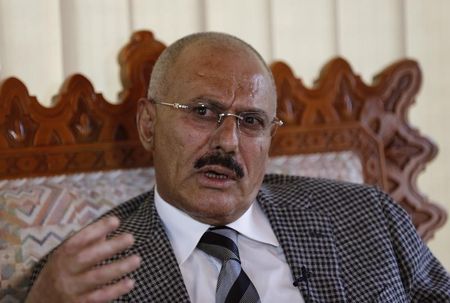SANAA (Reuters) - The United States on Thursday denied delivering any threats to former Yemeni President Ali Abdullah Saleh over what Washington suspects is his role in destabilising the Western-allied country.
An official source at Saleh's General People's Congress (GPC) party said on Wednesday that the U.S. ambassador to Yemen had delivered a message through a mediator for Saleh to leave the country by 5 o'clock (1400 GMT) on Friday or face international sanctions.
"The GPC statements about threats to Saleh from the U.S. are untrue," the State Department said in a statement. "There have been no meetings between the ambassador and GPC officials at which any such statements have been made."
The GPC official said Washington had delivered an ultimatum for him to leave or face sanctions that the U.N Security Council is expected to impose on him in line with requests by President Abd-Rabbu Mansour Hadi and the U.S. State Department.
The United States last week requested the U.N. Security Council impose an asset freeze and global travel ban on Saleh and two leaders of the Shi'ite Muslim Houthi group which controls Sanaa, on the grounds that they threatened the peace and stability of Yemen and obstructed the political process.
The U.S. sanctions request stated that since he stepped down in 2012 following widespread protests, Saleh "reportedly become one of the primary supporters of the Houthi rebellion" and that he was behind attempts to cause chaos throughout Yemen.
Saleh has denied seeking to destabilise Yemen.
A U.N. sanctions committee had been scheduled to discuss the U.S. request on Tuesday, Nov. 4. Several Western diplomats say the curbs are expected to come into force on Friday.

Saleh's office described the ultimatum as an unacceptable intervention in Yemen's internal affairs and vowed to resist it. "The source urged members of the General People's Congress and its allies and the masses of the Yemeni people to be alert and to prepare to confront all possibilities that threaten the security and stability and unity of Yemen," it said.
(Reporting by Mohammed Ghobari and William Maclean, writing by Sami Aboudi and ....... .........)
